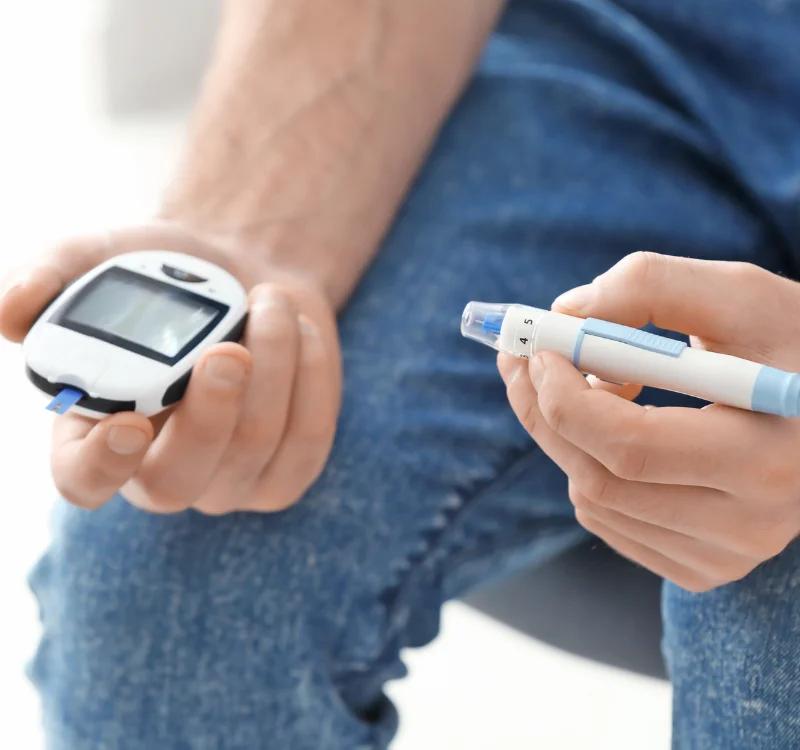How is Moringa Beneficial for Diabetes? A Natural Remedy To Control Sugar Levels
Feb 06, 2025

Moringa contains nutrients like calcium, vitamins, iron, magnesium, and various antioxidants. Let’s explore how moringa can be effective for managing diabetes!
Table of Contents:
- What is Moringa?
- How is Moringa helpful for Diabetes?
- Myths vs Facts: About Moringa and Diabetes
- How to use Moringa for Diabetes?
- Precautions & Side Effects
- Conclusion
- FAQs
According to Ayurveda, moringa is an effective medicinal plant. Moringa can help to balance all three doshas (Kapha, Pitta, and Vata) in our body. It promotes various health benefits like improving digestion and immunity. Many people use moringa to control their blood sugar levels. In this blog, we will find out how moringa is helpful for diabetes, simple ways to incorporate moringa powder for diabetes in the diet, along with the precautions and possible side effects.
What is Moringa?
Moringa is an ancient herb also known as the drumstick tree. People in South and Southeast Asia use this plant as a herbal medicine due to its various medicinal properties. Moringa grows best in tropical & subtropical regions. It is said that the whole moringa tree is edible. Moringa is rich in antioxidants and nutrients like calcium, potassium, iron, and vitamins (A, C, & E). When its leaves are dried, it can be converted into powder, which can also be used to maintain sugar levels.
How is Moringa helpful for Diabetes?
Many studies have suggested that moringa helps maintain blood sugar levels. It contains bioactive compounds like flavonoids, alkaloids, saponins, vitamins C & A, iron, and magnesium. Thereby making moringa a sought-after herb for diabetes.
The above-stated compounds altogether in moringa help:
Reduce sugar absorption.
Improve insulin sensitivity.
Fight inflammation.
Support heart health (Diabetes increases the risk of heart-related issues).
Myths vs Facts: About Moringa and Diabetes
With the increase in the use of traditional remedies, there are lots of myths believed by many. Let’s see the common myths about moringa for diabetes:
Myth: Moringa can cure diabetes.
Fact: Moringa can help manage blood sugar levels, but it can’t cure diabetes completely. Diabetes is a chronic disease and requires a proper lifestyle, diet, and medications as well.
Myth: More amount of moringa means better results.
Fact: Some think that consuming moringa in a large amount will benefit them and give instant results, but it’s not true. Consuming more moringa won’t speed things up; instead, it may cause side effects like too-low sugar levels, diarrhea, and low heartbeat.
Myth: Moringa instantly lowers blood sugar levels.
Fact: Moringa helps in lowering blood sugar levels; traditional remedies do not work instantly, but being consistent can be effective and show better results.
How to use Moringa for Diabetes?
Let’s see the simple breakdown for incorporating moringa for diabetes in your diet in the form of leaves, powder, or capsules.
Leaves: Boil a few moringa leaves in water, add lemon and honey, and drink it as tea. It can also be added to salad and soup.
Moringa powder: You can add moringa powder to tea, smoothie, and juice. Avoid adding it to sugary drinks, as it can interfere with the nutrition present in moringa as well as lowering the sugar levels, so adding it with a sugary drink will not be effective.
Moringa powder Dosage for diabetes: Start moderately with half a teaspoon daily and gradually increase it to 1 or 2 teaspoons. People suffering from diabetes should consult their doctor for the exact dosage.
Moringa capsules: You can also consume moringa capsules.
Dosage: Take one capsule twice daily, and for the exact dosage, you can consult the doctor.
Precautions & Side Effects
Moringa can lower blood sugar levels so monitor it regularly.
If you are already taking any medications related to diabetes or any other condition consult your doctor before taking moringa in any form as it can hinder your health.
Consuming moringa in the form of powder to manage diabetes is an excellent and convenient choice. At first, the recommended dosage of moringa powder for diabetes is half a teaspoon per day. Gradually, you can increase it to twice a day.
Don’t take moringa excessively as overconsumption can lead to problems like diarrhea.
You can be allergic to moringa, if you start experiencing itching, swelling, or breathing difficulties, stop using it immediately.
Pregnant & breastfeeding women should avoid consuming moringa without a doctor’s advice.
Conclusion
Moringa is a very useful and effective plant if used correctly. It’s filled with antioxidant compounds. Many people use moringa for diabetes as it helps regulate blood sugar levels. Moringa can be used as powder, leaves, or capsules. Incorporating moringa into your lifestyle is very simple but always remember to not overconsume it as an excess of something can cause problems. Traditional remedies do take time but being consistent can be the key to getting better results over time.
Frequently Asked Questions
If you have diabetes, then yes you can take moringa on an empty stomach but if not then it is preferred to take after a meal.
You can use moringa powder for diabetes by making moringa tea or adding it to smoothies, soups, and curries. However, moderation is key—be sure to consume it in moderation to avoid potential side effects like an upset stomach.
The best way to take moringa for diabetes is to take 2 capsules or 2 tablespoons of powder daily. Additionally, you can make moringa tea or add moringa leaves to soups and curries.
For an appropriate moringa powder dosage for diabetes, you can start taking half a teaspoon daily and gradually increase it to 1 to 2 teaspoons. To know the exact dosage it is recommended to consult your doctor.
Yes, it is safe to consume moringa powder every day. However, when it comes to moringa powder dosage for diabetes, it must be consumed in moderation. Excessive consumption can cause problems like diarrhea.
Possible side effects of moringa for diabetes are: excessive consumption of moringa can lower your blood sugar levels too much and can cause stomach problems like diarrhea and bloating.
If you are consistent, it would take around 3 to 4 months for moringa to lower blood sugar levels.















